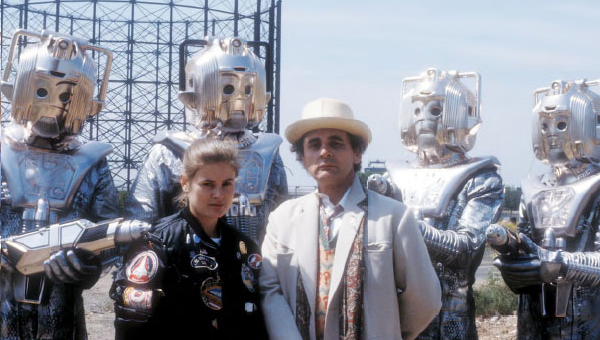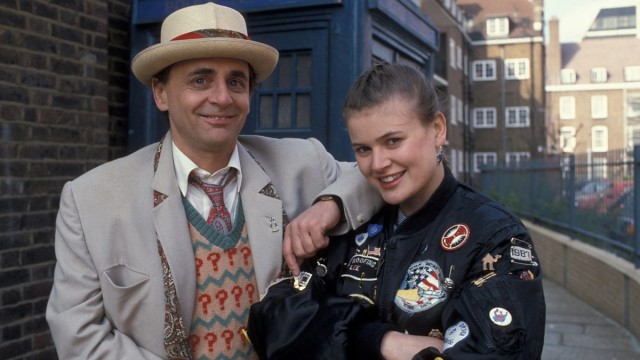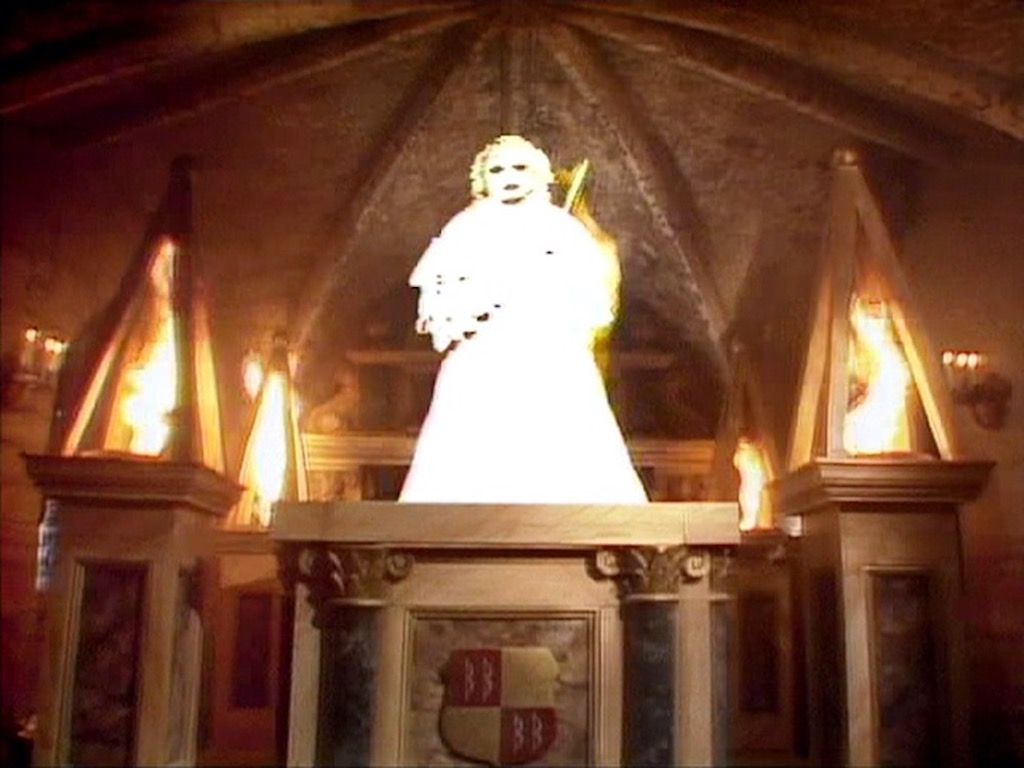Doctor Who Season 25 coincided with the programme’s 25th anniversary celebrations, and the production team took the decision to delve deeper into the Time Lord’s mysterious past.

By the time Doctor Who Season 25 came around, the programme had been on the air for a quarter of a century. And remarkably, few stories had actually explored the Doctor’s origins, or indeed played with the idea of the Doctor’s true identity to any significant extent.
But when script editor Andrew Cartmel joined the programme in 1987, he decided that he wanted to re-establish some of the mythos around the Doctor’s character, and it wasn’t until Doctor Who Season 25 that this idea (known as the Cartmel Masterplan by fans) started to take root. This involved digging around in the Time Lord’s past, and throwing up new, tantalising nuggets of information to whet viewers’ appetites.
This was most apparent in Doctor Who Season 25’s opening story ‘Remembrance of the Daleks,’ which – while continuity-heavy – is widely regarded as a classic Doctor Who tale. It adopted the location of the first Doctor Who serial – ‘An Unearthly Child‘ – and saw the Seventh Doctor and Ace arrive in London in 1963, returning to the Foreman junkyard that the TARDIS took off from in the very first story. Moreover, much of the action in ‘Remembrance of the Daleks’ took place in the Coal Hill School, which is where the Doctor’s granddaughter Susan was a pupil.
What was exciting about this Doctor Who Season 25 adventure, however, was the explanation about what the Doctor had been up to before ‘An Unearthly Child.’ Apparently, he came to Earth with a powerful piece of Time Lord technology known as the Hand of Omega, which had been instrumental in the formation of Gallifreyan society. It was a remote stellar manipulator, which had the ability to turn stars supernova and generate black holes, which were needed to make time travel possible.

It was this technological discovery that had given Time Lords their supremacy, and the Doctor hinted that he had played a part in its development, telling Ace that he had problems with the prototype, before correcting himself. This implied that the Doctor, Rassilon and Omega (key figures in early Time Lord society) had worked together in Gallifrey’s early days.
But perhaps the most memorable part of this Doctor Who Season 25 story was the return of the dreaded Daleks, plus their demented creator Davros. The Daleks wanted the Hand of Omega for themselves – a plan that culminated in the Doctor and Davros heckling each other via a rudimentary video link. Here, there was an interesting deleted scene where Davros berated the Doctor for being “just another Time Lord,” and the Doctor cryptically replied: “Oh Davros, I am far more than just another Time Lord.” This added weight to the earlier allusion that the Doctor was an important figure from Gallifrey’s past.
Later, of course, episodes such as ‘The Timeless Children‘ would be more specific about the part that the Doctor played in Gallifrey’s origins. In that particular episode, it was revealed that the Time Lords had actually derived their regenerative ability from the Doctor’s unique DNA. Doctor Who Season 25, however, was much vaguer in the suggestions that it gave.
This was certainly in evidence in Doctor Who Season 25’s third serial ‘Silver Nemesis,’ which again explored events from the Doctor’s past. In this story – which also saw the return of the Cybermen – it was revealed that the Doctor had launched a form of living metal known as validium into space – in comet form – on a trajectory that would bring it back to Earth every 25 years. Validium originated on Gallifrey, and was created as the ultimate weapon of defence by Rassilon and Omega. Although quite how it fell into the Doctor’s hands is a mystery.

One of validium’s strange qualities was its sentience; it had the ability to think and speak for itself, and when it came into the possession of the villainous Lady Peinforte, it told her all about the Doctor’s origins. In the final episode of ‘Silver Nemesis,’ Peinforte tried to blackmail the Doctor into letting her have the validium (now a statue) by threatening to reveal his identity. She said she knew all about the dark times of Gallifrey, and the time of chaos.
And although the Doctor seemed momentarily perturbed by this threat, he eventually dismissed her; he admitted that he couldn’t care less if the Cybermen found out who he was, and the Cybermen concurred that they had little interest in the Doctor’s secrets.
Arguably, this moment in Doctor Who Season 25 was one of the first times the mystery of the Doctor’s name had been seriously addressed since the very first episode. Indeed, the writer of ‘Silver Nemesis’ Kevin Clarke revealed that he was keen to re-establish the Doctor’s enigma and set the show up “for the next 25 years.”
And the relaunched series in 2005 certainly picked up where Doctor Who Season 25 left off, at least in its ambition to create a sense of mystery around the Doctor’s identity. The 2008 episode ‘The Forest of the Dead’ was particularly mysterious, with the Doctor encountering a person from his future who whispered his own name in his ear (the archaeologist River Song, no less.) And the 2013 episode ‘The Name of the Doctor’ created a whole story around what it described as the oldest question in the universe, hidden in plain sight: Doctor Who?
As such, the current version of Doctor Who owes a lot to the foundations that were laid out in Doctor Who Season 25. And whilst the revelations that were made in 2020’s ‘The Timeless Children‘ continue to divide fandom, there is no doubt that the debate around the Doctor’s true identity continues to rumble on.
What’s your favourite story from Doctor Who Season 25? And do you think it revealed too much, or too little? Let me know in the comments below.

Seventh Doctor jumper – order now from the Lovarzi shop!








Remembrance of the Daleks is my favourite 7th Doctor story though I enjoy them all. I’m happy with the Cartmel Masterplan and Sylvester McCoy was a delight to see dropping hints about his past as clearly more than just another Time Lord. I still see William Hartnell as the original Doctor though and have ignored the Timeless Child preachings. Even the Morbius Doctors I’ve made into earlier incarnations of Morbius. Having been lucky enough to have a copy of Lungbarrow I’m a lot happier with what that novel suggests about the Doctor’s origins than I am with the can of worms Chris Chibnall opened and just left after that. As for the 7th Doctor I loved the way he became even more manipulative in the Virgin novels in the 90s and I’m gutted Sylvester didn’t get a fourth season to see how Cartmel’s plans would develop. I would have liked that more than anything because of the direction the show was already heading.
There’s nothing wrong with William Hartnell not being the very first Doctor, because it’s everything that happened after he ran from Gallifrey that was important to the development of his character, not what happened before or what numbered incarnation he is.
Yes the Fugitive Doctor being Pre-Hartnell is contradictory on the surface, but remember that the TARDIS is a sentient time and space machine, who can archive future console rooms as stated by the TARDIS in The Doctor’s Wife. So if she can do that she could archive chameleon circuit appearances too. What I’m trying to say is that the TARDIS the First Doctor stole from the repair shop was his Pre-Hartnell TARDIS, and that when the Fugitive Doctor went on the run from Division, the TARDIS deliberately brought her to Earth so that the 13th Doctor could meet her, and having archived the Police Box appearance for this event, took on the disguise so that when the 13th Doctor dug her up outside of the Lighthouse, she’d know that it was her TARDIS. And the Fugitive Doctor using the title Doctor isn’t canon breaking either, because Doctor has multiple meanings, and the Fugitive Doctor didn’t act like her title meant healer. So it could’ve meant scientist to her.
The 8 faces weren’t Morbius, Phillip Hinchcliffe the producer of the story and one of the crew members that played the 8 Pre-Hartnell Doctors has confirmed multiple times they were the Doctor, and it’s said on screen by Morbius twice, “How far Doctor, how long have YOU lived” and “Back, back to YOUR beginning”
I completely understand disliking the reveal that the Doctor was the origin of regeneration as that makes them inherently integral to the existence of Time Lord society, but everything else revealed about the Doctor: Pre-Hartnell Doctors, service to Division, being a Time Lord Founder, having Tecteun as a parent, and being a foundling adoptee, all fits with the Doctor’s character and canon of the show, so doesn’t need to ignored.